#vicksburg surrender
Text
Vagabond

Vagabond — wandering from place to place without any settled home
Poly Lost Boys x GN Reader
Synopsis: Forgiveness is a fickle thing. When four souls find each other, the world finds its equilibrium once more; until the absence of another tips the scale forever. What happens when a familiar face shows itself back at the boardwalk after twenty years of absence?
Warnings: slight angst, lots of historical information in the beginning
Word Count: 3k
By issuing the Declaration of Independence, adopted by the Continental Congress on July 4th, 1776, the 13 American colonies severed their political connections to Great Britain.
You had been ten during the conflicts between America and Great Britain, young and impressionable. Your family came with Puritans, who set sail to America back in 1630. Unlike the Pilgrims, who had left ten years earlier, the Puritans did not break with the Church of England but sought to reform it. All that happened before you were born; your ancestors had settled down and spread their roots into American soil.
You recalled little of the American Revolution; after all, you were very young back then, but you remember December 15th, 1791, vividly. Your mother couldn't stop crying that day, and your father had pulled out the oldest whiskey they had that day. America was finally severed from the tyrannical rule of George III.
You came to understand the significance of those dates more as you aged, growing into a strong individual as you helped your family on their farm. You never intended to marry; it wasn't something you had ever desired or looked forward to. The same year you had gotten married was the day you lost your immortality; both events are related but not necessarily connected. You were introduced to the vampiric community in New Orleans, a city that used the day to sleep off the mistakes you made throughout the rambunctious night.
You had lived through the formation of the Constitution of the United States of America in 1787 when the founding fathers sought to implement more structure into the now independent country.
The infamous whiskey rebellion. American drunks apparently were not too keen about Alexander Hamilton implementing a liquor tax to try and raise money for the national debt; asserting the federal government's power back in 1794.
Only nine years later, the Louisiana Purchase happened in 1803. The small land purchase for only $27 million created room for the states of Louisiana, Missouri, Arkansas, Iowa, North Dakota, South Dakota, Nebraska, and Oklahoma, along with most of Kansas, Colorado, Wyoming, Montana, and Minnesota.
Throughout the 1810s and 1830s, you had moved on from New Orleans and left for New York, seeking human connections and reconnecting with the younger generations. During that time, the Battle of New Orleans in 1815 and the Monroe Doctrine in 1823 seemed to fly past you.
Then, signed on February 2nd, 1848, the Treaty of Guadalupe Hidalgo finally brought closure to the Mexican-American war. At this time, you were no stranger to political conflicts anymore, and the stench of blood and sweat staining battlefields was, unfortunately, no stranger.
Life moved on regardless, no matter the horrid realities life provided. For a short while, life had finally come to a stand-still, guns tucked away as the world in America resumed its development. Until April 12th, 1861, Confederate troops fired on Fort Sumter in South Carolina's Charleston Harbor at 4:30 A.M., A day that changed America forever, the beginning of the American Civil War.
The Emancipation Proclamation, The First Conscription Act, The Battle of Chancellorsville, The Vicksburg Campaign, The Gettysburg Campaign, The Battle of Chickamauga, The Battle of Chattanooga, The Siege of Knoxville. The list continued, and the coppery smell of wasted humanity tainted the air, the wind carrying the cries of victims throughout the nation.
The war ended in the Spring of 1865. Robert E. Lee surrendered the last major Confederate army to Ulysses S. Grant at Appomattox Courthouse on April 9th, 1865.
The number of soldiers who died throughout those four years eventually got estimated to be around 620,000.
Only 47 years later, on July 28th, 1914, the Austrian Archduke Franz Ferdinand was assassinated, beginning the cruel trench warfare of World War I. In early April 1917, America aided the effort to join a war to end all wars. You had entered the war effort, like everyone capable at the time; from soldiers to nurses, everyone gave aid.
On November 11th, 1918, the war ended. Although the Allies won, you found no reason to celebrate. Not when mothers sold their homes since there wasn't a reason to have a multiple-bedroom house anymore, when graveyards overflowed with the dead, when people mourned their losses, when mothers' only answer to their missing sons was a notice declaring their child missing in action.
The stock market crashed in 1929, kicking off the Great Depression that would last for more than a decade.
On September 1st, 1939, Germany invaded Poland. Kicking off World War II and beginning one of the most brutal warfare's, Blitzkrieg. On May 8th, 1945, Germany surrendered. After the atomic bomb was dropped on Hiroshima and Nagasaki, Japan surrendered on September 2nd, 1945, and the Second World War came to an end.
The war ended, and the surviving soldiers returned with missing limbs and broken spirits. You were a firm believer that humans were not meant to witness so much death; it tainted them; it dulled them. Although you were a vampire, a creature supposedly made for horror, you could not forget what you had witnessed in only the span of 21 years.
You were 201 years old now, relatively young in the grand scheme of time, but you had lived through a few of the greatest horrors the world had ever seen.
189 years of traversing the lands, you watched grow in a desperate search to find one of your own. Since you were turned and left New Orleans, you had not met a single vampire. You watched with sorrowful wisdom in your eyes as the world passed through you, virginity in people's expressions you wish you had. A gaze untainted by warfare, civil unrest, and brutality.
Although you have met the occasional human to brighten your own world, it did not cure you. Your search was desolate—fruitless.
Your feet had carried you to Santa Carla, the year now being 1963, and just as the five stages of grief had settled on acceptance. You bumped into a group of four rambunctious bikers that would change your life forever. That had been the first time you had met, and you had continued to live together, going on to live through the Civil Rights movement and grieving the assassination of Martin Luther King, Jr.
But on August 12th, 1967, you left Santa Carla. Your absence is only justified by a delicately written letter standing in your place. You had grown to love the boys, but you had lived differently compared to them.
Marko and Paul were younger vampires than you, having been turned while The Great Depression was bulldozing America. Dwanye had been older, abandoning his immortality in the 18th century along with David. All of them possessed the innate ability to move on from the past, a talent you, unfortunately, did not possess.
No matter how hard you tried, you could not find peace or excitement in the future. The uncertainty corrupted you, tormented you and your experiences, so you left. Not with the intent to abandon but to sort out whatever you had to sort out. Away from the prying eyes of those you loved, those who you did not want—couldn't disappoint.
Santa Carla, the town you had never been able to forget. It was 1987 now; twenty years had passed since you had seen the four vampires. You had missed them—a melancholic weight having nestled its way into your heart ever since you left. You regretted the way you had left through a simple letter. A cowardly move; you were wise enough to understand that. But at the time, you couldn't bring yourself to say it to them. How could you? Look someone in the eyes, someone like you—your own pack that never did anything but love you—and tell them you were leaving?
You didn't have the heart, and if you were a little more honest, you didn't have it now, either. But you missed them more than your hurt pride by walking what felt like a walk of shame as you wandered around the busy boardwalk. One thing you never could get used to was the constant shift in fashion, it felt like the ins became the outs overnight, and you never were able to keep up with it.
Bright colors were the most fashionable now, with teased hair and loud makeup. You enjoyed it, your knowing eyes watching over the crowd. The smell of hairspray permeated the air, wafting towards you as you passed people. Bulky and oversized clothes were spotted throughout the crowds, some men and women wearing specific member-only jackets. Ah, it seems the surfer nazis still haven't given up on Santa Carla yet.
The amusement park was new; back in 1867, the boardwalk had small shops littered around—like a market. Originally it mostly sold food and groceries, fish caught fresh from the sea, and farmers selling their produce.
How has the pier changed so significantly? If it wasn't for the bold, attention-seeking sign that said Santa Carla Boardwalk; you would've thought you were at the wrong address. But stepping on those old wooden floorboards of the pier that occasionally creaked or sunk under your feet was an all too familiar feeling. The smell of salt, rotting seaweed that had washed onto the shore, and the fresh street food made you feel all too at home.
It felt like you had never really left.
Your appearance had changed quite a bit since you left Santa Carla, so you didn't expect either the boys or Max to really recognize you. But although you were willing to stay under the radar for the boys, Max was another story. He was a head vampire, a coven leader, and therefore needed to be notified of your presence.
Entering Max's video store made you feel nostalgic, the same old grimy bell still hanging atop the doorframe signaling your arrival; you had been the one to put that there to originally annoy Max. You were surprised he kept it. The wooden floorboards and furniture gave off a distinct, homey smell. You had been there when the store was built, and the shiny coating across the floors now had grown mat, occasional wood panels brighter in color than before.
"I never thought I'd meet the day I saw you walk through those doors again."
Turning around, you met the stern gaze of Max. His outfit made you smile, a desperate attempt at blending in with the crowd. Max was always a stickler for blending in; if he had no intention of turning you; you had no business knowing who; or rather what, he was.
"It's good to see you."
"I'm flattered, but I doubt that I am the sole reason you returned." Max always carried that knowing tone, as if he's watched out every move you'd make before you made them. It reminded you that Max had a coven before the boys and you, one he rarely conversed about. Perhaps Max really had seen this turn out before, but analyzing that surprised expression, you could only assume who had left never did come back.
"How right you are," You sighed, shoulders dropping as you hopped onto the cashier counter. It was before opening, meaning you and Max had some time to chat privately.
"Twenty years is a long time," Max hummed, a low and almost chiding tone. "What made you come back?"
"To us, it isn't," You weakly argued back. The cumbersome feeling, or rather an awareness that you were in the wrong, was nearly unbearable. You were smart enough to understand that denial was a fruitless endeavor, and yet you couldn't help but let those desperate attempts escape you.
"For people waiting for you, it's an eternity." Max sighed in a calm but chiding tone. Although Max never did have to scold you the way he did with the boys, from not committing arson to preventing fights. Max instead focused his guidance towards you on a more emotional level, the morality; a bit ironic being taught by a vampire—but he did his best.
You glanced outside, through the glass walls of Max's shop, watching the bustling crowd pass you. Twenty years to a vampire was nothing, but somehow the short span of time felt arduous. Why did you come back?
"I never intended on staying away forever. I knew that when the time was right, I'd return." You explained, stealing a quick glance at Max. The older man had a frown etched onto his face, eyebrows furrowed as his own gaze lingered on the rambunctious humans outside. So unaware of the constant and unrelenting passage of time. It was cruel to be immortal; the passage of time no longer hindered you. But emotions are bendable and are the only aspect of ourselves that remains from who we were. Emotions were mortal.
"Santa Carla has changed, Y/N. It is not what you left behind; they are not the same as they were alongside you." Max recalled, his voice disapproving.
You knew Max was correct; you knew deep in your wrenching and twisting gut. You jumped off the counter, your feet hitting the floor like gravity had shifted around you, sinking your body into the floor. "I know," you knew; perhaps the boys didn't even want to see you; they could curse you out and send your name to hell for all eternity. They deserved to do it too.
But they loved you once, and perhaps you can't help shake the feeling that they might love you again this time too.
Max sighed, walking over to his front door and twisting the closed sign around, and pronouncing the store now open. Each tap of his foot, synced with his steps, was like a thundering echo inside you. It prompted you to get up and to provide closure for the others. You reach the door, opening midway before Max leaves you with some parting advice.
"I hope you find what you came here for, Y/N. But the time might be right for you now, but it might not be for them."
You nodded, not looking back as you walked out of the store. The air was warmer, humid from the ocean breeze mixing into the air, the notorious assassin for any styled and teased hair due.
Laughter was one of your favorite sounds. As cliche as that might sound, it felt rejuvenating to hear. Whether it was a loud cackle mimicking the call of a hyena or a high-pitched wheeze or whistle. There was a beauty in people's expressions, how their noses tended to scrunch up, or how others held their stomachs and nearly doubled over. Laughter was infectious, and you loved observing the dopamine spread to others. Strangers connecting over a similar sense of joy; there was a beauty in it.
The boardwalk was filled with it, people brushing shoulders against shoulders as they walked. Groups cackling and shoving each other as they enjoyed the youngness of the evening. Music booming from different directions, punks blasting the newest rap or metal music, hippies tuning out to a gentle jam, but the loudest seemed to be a distant concert down the boardwalk and closer to the pier. Like a bee sensing some honey, you followed. Dodging the occasional passerby, ducking out of the way from shop owners lugging their merchandise around.
The music got louder, and a small thread of excitement seemed to push you further, faster. Your small stroll transformed into a quickened step, your ears guiding you and your eyes following the crowd. The music was loud; a tight smosh-like pit had formed before the stage where people grind and brushed against each other to the beat of the music.
Looking around, you scanned the faces of teenagers and young adults. There was an eager but dreaded nervousness to your gaze at the thought of seeing a face that looked familiar. But it wasn't your eyes that caught their presence, but rather your sense of smell.
Copper.
Although it was harder to pick up when the wind stills its prancing, the occasional breeze led you further towards the pier. Away from the smosh pit, and where people stood to enjoy the music but not risk getting mulled over by a hormonal teenager.
There they stood, strikingly familiar. Although some of the fashion had changed, most of their originality stayed intact. That tiny red flag tied around Dwayne's waist was something the two of you had stolen from a stingy bar owner back in 1964; Markos jacket still had all too familiar patches sewn into its denim fabric; Paul still wore those bracelets you gave him, and David wore the most prominent reminder of you, his oversized coat.
The wind picked up around you, a cold and mocking breeze flowing through your hair and betraying your presence to the four men you had left behind all those years ago. One by one, heads lifted, smiling ceased, and laughter died. Although you had spent years preparing yourself for this moment, nothing felt so gut-wrenchingly real than standing before them.
How do you look someone in the eyes after you've abandoned them?
How do you move past that moment when the world around you stills and halts. When you lose yourself in the blear of the world when mortality reaches its hand around your heart and squeezes. A vice-like grip, a feeling blooming within your chest so heavy–so unspeakable. When you see those eyes, recognize the sorrow behind them and realize you were the perpetrator. You were the one who put that agony, that sadness there.
The burden of your actions ties itself around your throat like a noose, tight and unyielding, as you realize the cruelty was done by none other than yourself. And there is no way, in any shape or form, you could reverse the damage you've done. Pain is immortal, it might yield to its throbbing, but it never forgets.
A world with your boys back in 1967 exists now only in your memory. The four men, cold as the autumn waters, were your reality now.
"Hello, boys."
#the lost boys 1987#poly lost boys x reader#tlb#the lost boys marko#the lost boys david#the lost boys dwayne#tlb x reader#tlb paul#tlb david#tlb marko#tlb dwayne#dwayne tlb#paul tlb#marko tlb#david tlb#laddie tlb#star tlb#the lost boys star#the lost boys x reader#the lost boys#tlb fanfic#tlb x you#tlb headcanons#tlb imagine#the lost boys paul#the lost boys michael#tlb michael#michael x reader
474 notes
·
View notes
Text
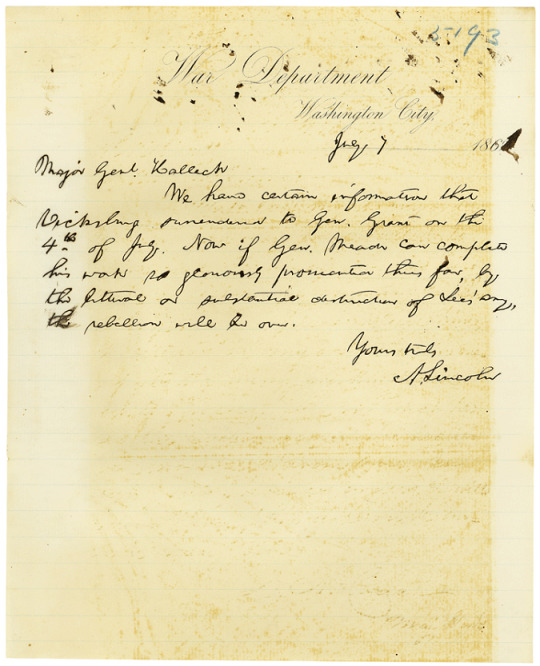
“Now if Gen. Meade can complete his work so gloriously prosecuted thus far, by the litteral or substantial destruction of Lee's army, the rebellion will be over.” Abraham Lincoln, July 7, 1863.
Record Group 94: Records of the Adjutant General's Office
Series: Generals' Papers and Books
File Unit: Papers and Books of Major General Henry W. Halleck
Transcription:
[in blue pencil in upper right margin "5193']
War Department
Washington City
July 7 186[ink splat]
Major Genl. Halleck
We have certain information that
Vicksburg surrendered to Gen. Grant on the
4th of July. Now if Gen. Meade can complete
his work so gloriously prosecuted thus far, by
the litteral or substantial destruction of Lee's army,
the rebellion will be over.
Yours truly
A.Lincoln [signature]
#archivesgov#July 7#1863#1800s#Civil War#U.S. Civil War#Abraham Lincoln#yeah#that if is doing a lot of heavy lifting#spoiler#Lee surrendered in April 1865
29 notes
·
View notes
Text
One of the most surprising things about my Civil War reading is learning how chummy things could be between the two sides. Obviously the conflict was tragic--brother against brother, families and friendships torn apart, a truly colossal amount of bloodshed. Yet there's a flip side to that, where knowing the people on the other side gives you a certain respect--even affection--for them that battle can't quite erase.
Most of the high-ranking officers served with each other in the Mexican War, which provided tactical advantages, because it's easier to make battle plans when you know the personality of the guy you're facing, but it also means they had memories of each other, had gained respect for each others' skills. There are plenty of times when Grant talks about a Confederate commander like, "Yeah, I knew him in Mexico, he was a good guy." Longstreet was the best man at Grant's wedding and was later one of the generals who surrendered to him at Appomattox. Grant tells stories about guys on opposite sides chatting with each other when the lines got close together, even gathering water at the same spot. After one battle (I'm pretty sure it was Vicksburg), the Confederate soldiers were being held in the city while the two sides arranged terms of parole, and once everything was settled, the Union men were kind of bummed to watch their new buddies leave in defeat. I read a story somewhere that there was a political meeting between the Confederates and the Union about reuniting, and obviously that went nowhere, but afterward the guys sat around chatting and drinking because they all knew each other from their years in the Senate.
These men were on opposite sides of a war, but they were still men, and it's interesting to see that the inhuman circumstances of war didn't blind them to the humanity of the enemy.
#history is awesome#presidential talk#granted some of this could be skewed because most of these stories come from grant's perspective decades after the end of the war#but i think there's still something to it
18 notes
·
View notes
Photo


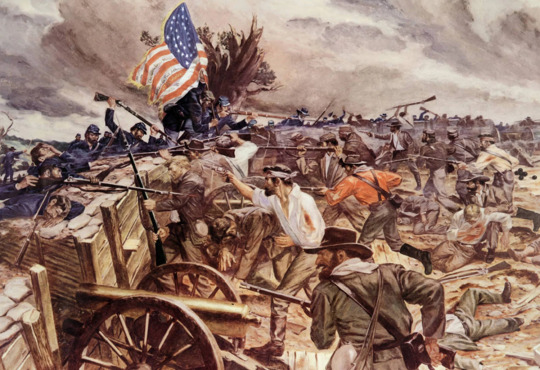
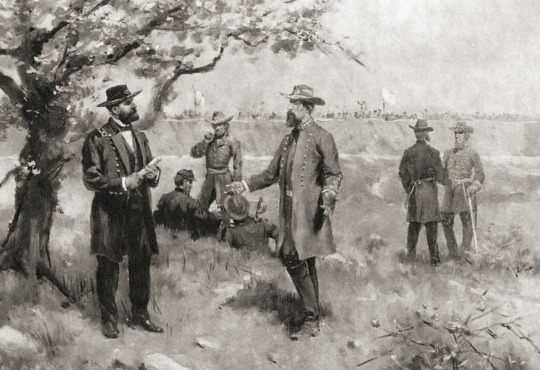


The Vicksburg Campaign, (1862–63), in the American Civil War, was a campaign by Union forces to take the Confederate stronghold of Vicksburg, Mississippi, which lay on the east bank of the Mississippi River, halfway between Memphis (north) and New Orleans (south). The capture of Vicksburg divided the Confederacy and proved the military genius of Union Gen. Ulysses S. Grant.
After the spring of 1862, when the Confederates lost Fort Henry, Fort Donelson, and Memphis in Tennessee and New Orleans in Louisiana, Vicksburg became the key remaining point of their defense of the Mississippi River. The capture of Vicksburg would yield the North control of the entire course of the river and thus enable it to isolate those Confederate states that lay west of the river from those in the east. Vicksburg was ideally suited for defensive purposes, however: it was situated on high bluffs along the river and was protected on the north by a maze of swampy bayous. The Confederates’ batteries on the bluffs could outgun any Union ships on the river.
A Union naval expedition using ironclads (May–June 1862) to subdue the Confederate batteries failed, as did an attempt to take the city by land from the north by Gen. William Tecumseh Sherman (December 1862) and an attempt by Grant to cut a canal around Vicksburg that would divert the river (February–March 1863). After this string of frustrating failures, Grant conceived a bold move that would enable him to take the city using the high-ground approaches from the east, well behind Confederate lines. Moving his army of 40,000 troops to the west bank of the Mississippi, he marched south along it for a considerable distance until he could recross the river at Bruinsburg, which lay about 30 miles (48 km) south of Vicksburg. His army recrossed to the east bank of the river by means of a Union fleet, which, under the command of Adm. David D. Porter, had run south past the batteries at Vicksburg. Once across the river, Grant quickly began moving northeast, though this meant abandoning his already tenuous supply lines and feeding his troops off the surrounding enemy countryside. His forces took Port Gibson on May 2, reached Grand Gulf on May 3, and prevented the small Confederate army of Gen. Joseph E. Johnston near Jackson from linking up with the Vicksburg forces.
Vicksburg’s commander, Gen. John C. Pemberton, led his forces out in an effort to link up with Johnston but met Grant moving westward and was forced to return to the city. On May 18 Grant arrived in the rear of Vicksburg, within which Pemberton’s 30,000 troops were isolated. After two assaults in mid-May failed, Grant settled down to methodical siege tactics while augmenting his forces. He controlled all the approaches to the city, and by early June the Confederate garrison was desperately short of ammunition and on the brink of starvation. Pemberton surrendered the city on July 4.
The surrender of Vicksburg, with the victory at the Battle of Gettysburg the previous day (July 3), greatly heartened the North and in fact marked the turning point of the war.
#ulysses s grant#vicksburg#american civil war#history#us civil war#the glorious 4th!!#always gotta make a vicksburg post for 4th of july#the twin victories! vicksburg and gettysburg!#the burgs strike again!#if you're looking for a great series of books about the wholeee vicksburg campaign...timothy b smith is the man to look at#his books?? *chefs kiss*#i'm getting a new one this week and i'm too excited to read it...
41 notes
·
View notes
Text
Tucked away in an amendment to the FY2023 U.S. defense authorization bill is a rare instance of congressional bipartisanship and a tribute to U.S. President Ulysses S. Grant.
If approved, the measure would posthumously promote Grant to the rank of General of the Armies of the U.S., making him only the third person – along with John J. Pershing and George Washington – to be awarded the nation’s highest military honor.
As Executive Director of the Ulysses S. Grant Presidential Library, I believe that the promotion would be much more than a symbolic nod to a great military general. Rather, it would highlight the overlooked legacy of a man who fought to end the last vestiges of slavery.
OUTBREAK OF CIVIL WAR
During the Civil War, Grant rose to fame as a decisive leader who was willing to doggedly pursue Confederate armies and avoid retreat at all costs. He first gained his reputation for tenacity with Union victories at Shiloh, the Battles for Chattanooga and the Siege of Vicksburg.
Like most white Northerners, Grant signed up to fight for the Union – not for emancipation.
But by 1862, the freedom of enslaved African Americans had become vital to the Union war strategy, if not yet its cause.
A year before President Abraham Lincoln signed in 1863 the Emancipation Proclamation that freed enslaved people in the Confederate states, Grant oversaw the establishment of refugee, or contraband camps, throughout the Mississippi Valley. Those camps provided basic housing, food and work for Black men and women who had fled from slavery.
Grant also administered the enlistment of African American men into United States Colored Troops units during the Vicksburg campaign.
In March 1864, Lincoln appointed Grant to the rank of lieutenant general and ordered him to take on the Confederate Army in Virginia, a task at which numerous other Union leaders had failed.
At this point during the war, Grant assumed the role of chief strategist for the entire Union war effort. It took the next 13 months of fighting during the Overland campaign before Confederate General Robert E. Lee surrendered to Grant at Appomattox on April 9, 1865.
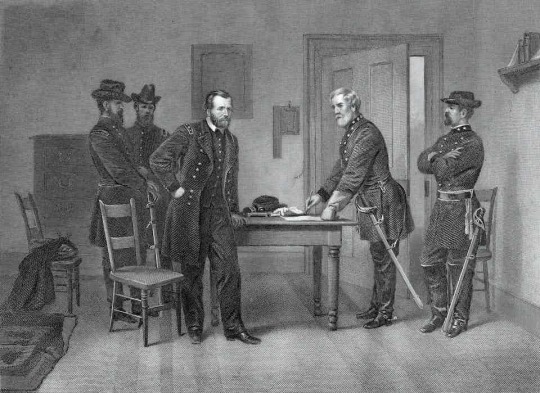
In this illustration, Gen. Ulysses S, Grant, left, accepts the surrender of Gen. Robert E. Lee. (Getty Images)
After the Federal victory, many Americans hailed Grant as the man who saved the Union.
But Grant was magnanimous in victory.
Multiple times during the war he honored the dignity of his defeated adversaries, most famously at Appomattox, where he did not require Lee to hand over his sword, as usually required. Grant also allowed Confederate officers to keep their sidearms and horses.
Lee appreciated Grant’s actions, remarking: “This will have the best possible effect upon the men … it will be very gratifying, and will do much toward conciliating our people.”
IMPACT OF THE ‘LOST CAUSE’
But after the war, the conciliatory feelings vanished.
Southern partisans constructed the narrative of the “Lost Cause.” It held that the root of the Civil War was not slavery, but the rights of states to control their own destinies. It further held that the Union victory had nothing to do with Confederate character or leadership, but rather the Union’s sheer numbers and superior resources.
In this Lost Cause narrative, Grant was seen as a bumbling butcher devoid of any meaningful strategic vision, who succeeded only by mercilessly throwing more soldiers at his enemy. It also revived the old rumors of his excessive drinking.
In this storyline, Grant’s foil was always the courtly gentleman, Robert E. Lee. The hagiography of Lee demanded Grant’s inferiority.
By the early 20th century, the Lost Cause was no longer isolated in the South and had spread across America. Crowds flocked to see the racist anti-Reconstruction “Birth of a Nation” in movie theaters, and during the World War I rush to build military bases, the Army named 10 of them after Confederate generals.
PRESIDENT GRANT’S FIGHT FOR EQUALITY
Grant served as President from 1869 to 1877 during a time when white Southerners proved hostile toward federal Reconstruction measures that sought equal rights for recently freed enslaved people.
Grant saw his role of enforcing these policies as an extension of his wartime duty and necessary to protect the gains of the Union victory, especially the newly established rights for African Americans.
He used the resources of the federal government to crush the Ku Klux Klan, established the Department of Justice to investigate civil rights abuses and signed the Civil Rights Act of 1875.
GRANT’S LATEST CAUSE
In recent years, the American public has questioned the Lost Cause and taken steps to mitigate its pervasiveness throughout the U.S.
Southerners themselves have chosen to remove Confederate leaders from town squares and state flags. The U.S. Army has established a Naming Commission to rebrand Confederate-named bases.
It is telling, too, that Grant’s Presidential Library is now located in Mississippi, a Deep South state he once conquered.
It remains to be seen whether the request made to elevate Grant’s rank by U.S. Senators Sherrod Brown of Ohio, a Democrat, and Roy Blunt of Missouri, a Republican – along with GOP U.S Rep. Ann Wagner – will be finally approved by Congress as part of the FY2023 National Defense Authorization Act.
Either way, in my view, a thoughtful reconsideration of Grant’s wartime and post-war contributions is long overdue.
#us politics#us history#Anne Marshall#news#Ulysses S. Grant Presidential Library#national defense authorization act#General of the Armies of the U.S.#John J. Pershing#George Washington#american civil war#american slavery#president ulysses s. grant#Emancipation Proclamation#president abraham lincoln#United States Colored Troops#confederate surrender#Lost Cause myth#reconstruction#birth of a nation#ku klux klan#Civil Rights Act of 1875#department of justice#Grant’s Presidential Library#Sen. sherrod brown#sen. roy blunt#Rep. Ann Wagner#2022#the conversation
14 notes
·
View notes
Note
I saw ur bio and i took the opportunity - I'd love to know more about Sherman!
You’re my new best friend oh my god. Uhhhhhh where do I start. probably with sub-general information . Born in Ohio in 1820, 5th of 11 children, his father died when he was nine and he moved in with his neighbors, Thomas and Maria Ewing, and their kids. Super easy change because he was close friends with their oldest son. He goes off to Westpoint academy at age 16 (lots of Civil War generals attended, Grant would have started two years later!) and shared a room with future General George Henry Thomas. Graduated as a private, joined the military, married his foster sister Eleanor “Ellen” Boyle Ewing (although her father didn’t want them to marry because he knew Sherman would never be at home) and has a couple of kids, leaves the military to pursue law and then banking and does kinda not that great at both. I think he moved down to Kansas and then went back South to be a superintendent at a military college. While working here he hears that the South has begun to secede, has a fit over it (cried, yelled at a confederate sympathizer teacher, and paced around his room complaining for a bit if I recall correctly?), refuses to send supplies to the Southern government. Moves his family out of the South and secures himself a placement in charge of a camp in Kentucky. While at Kentucky he suffers from a manic episode and becomes extremely anxious that the Confederates are approaching the camp, begs for and demands more troops from Lincoln, his wife comes down there to drag him back home. After recovering he jumps back into the war and begins to work under General Grant where he thrives and stays for the rest of the war. Uhhhh skipping over stuff most people would know, around the time of Vicksburg?? I think?? His family visits the camp, his favorite son (William Tecumseh Sherman, Jr.) catches a fever and dies. Sherman’s destroyed and then not super long after leads the March to the Sea where some pretty sick war crimes are committed by his troops and the politicians are kinda losing their shit but he’s damn effective either way. Gets Joe Johnston to surrender by offering terms he doesn’t have the power to offer, gets his ass chewed by Secretary of War Edwin Stanton (and they never stopped fighting until one of them died) and was promoted to General of the Army when Grant became president. Had a falling-out with Grant over his offering Secretary of War John Rawlins extra control over the army and moves his office back to his house. After a while he retires and is kinda just a guy who talks at parties and college graduations, his wife dies and he’s totally destroyed about it, and maybe 2 (?) years later he catches pneumonia and bites the dust. Generally super interesting guy, I’d suggest picking up some books on him some time!!
#thank you so much for asking wow I needed to get all of that out of my system#autism time autism time my brain is filled with thoughts of civil war generals#this is not nearly as in-depth as I’d liked to have been but I didn’t wanna make it ridiculously long#i hope you learned something new and I hope you enjoyed!!
7 notes
·
View notes
Text
The only holiday I celebrate today is the Surrender of Vicksburg, in which Ulysses S. BAMF Grant handed the Confederacy another piece of its ragged ass.
1 note
·
View note
Text
0 notes
Video
youtube
The Future Is Unwritten: With Heather Cox Richardson
COMMENTARY:
David Chalmers will convey my commentary regarding the connection between Jomini and the Benning Road Beaty Shop Learning Community, In regards to Lincoln , Robert E. Lee knew that the Union controlled the 4th wall of Jomini's battle space before Virginia left the Union. Like Nehemiah, he had literally hung the gates at Fortress Monroe that sealed the fate of the so-called Confederacy before it cold create a critical mass for the lynch mob they needed to fire of Ft. Sumter. Assholes like Tommy Tuberville and Moscow Mitch McConnel. Fortress Monroe was the pinion around which the Anaconda Plan was designed to coil around the rebellious states and prevent succession, which was perfected when Grant captured Vicksburg and perfected Scott's design, The best that Tommy Tuberville can claim is that her ran an organization about the sine of Nathan Bedford Forrest's command, successfully, for its entertainment value. The Theatre of SCC Football, Old Miss, Crimson Tide sort of sports narrative,
Anyway, Lee knew that the Southern rebellion was doomed before it was born. It was the political equivalent of a post-natal auto abortion. Lee went south because, o matter what he did, he was going to end up killing Virgoan and he felt it was his Duty to lead them to achieve the greatest possible benefit from their sacrifice. The politics of assholes like Tommy Tuberville, MAGA Mike Johnson and the January 6 majority forced Lee and all the West Pointers into an existential dilemma emerging from his dedication to Duty, Honor, Country. That's why the Union veterans had not enthusiasm for hanging their Southern classmates. That's exactly what Lincoln meant when he instructed Grant and Sherman to "Let'em up easy", a wrestling ethic. Win or lose, the Finite Game was over. That was Lincoln's divine genius at work. MAGA Mike Johnson's operating definition of Romans 13:1 - 7 violates entirely the spiritual grace of Lincoln. Which is why Eisenhower admired, Lee.
In Lee's case, he conducted a deliberate campaign of martial theater in hopes of reprising Saratoga and bringing a British intervention in favor of the rebels. Once Lee got started, he couldn't quit until his soldiers could accept their own surrender.
Now, Tommy Tuberville may have worked 18 hours a day as a football coach, but he didn't get a bunch of his players killed every Saturday for the entertainments value. There may be some walking wounded at the end of a season, but there was no horse-drawn caisson in the rituals of the SCC.
The people who think like Tommy Tuberville created the blind spot in Israeli security that Hamas flew through for two years and landed on October 7. Bush/Cheney seriously dammages the American security apparatus and Edward Snowden's data dump opened a bunch of back doors which included the Hamas trap door.
Here's the thing: Hume's rules of evidence refutes categorically the Pro-Life theology of the Total Depravity Gospel of Campus Crusade for Christ as products of the anti0Christ.
0 notes
Text
Siege of Vicksburg 1863
In this video from the Emerging Civil War Summer Symposium, historian Timothy B. Smith gives us an excellent presentation on the Vicksburg campaign of 1863.
The video’s description reads, “Historian Timothy Smith discussed the Vicksburg Campaign, which ended with the Confederate surrender on July 4, 1863. Union control of the Mississippi River split the Confederacy in half and gave Union control…
View On WordPress
0 notes
Text
civil war in usa
The American Civil War (1861-1865): A Pivotal Conflict Reshaping a Nation
The American Civil War, often referred to as the Civil War or the War Between the States, stands as one of the most significant and defining events in the history of the United States. It was a conflict of tremendous scale and consequence, reshaping the nation in profound ways. This war, which raged from 1861 to 1865, was rooted in complex socio-political and economic factors, with slavery at its core. To comprehend the depths of this conflict, we must explore its origins, key events, major players, and its enduring impact on the United States.
Origins of the Conflict
The seeds of the Civil War were sown well before the first shot was fired at Fort Sumter. One of the primary causes was the contentious issue of slavery. In the early 19th century, as the United States expanded westward, the question of whether new territories would permit slavery or not became a source of intense debate. The Missouri Compromise of 1820 and the Compromise of 1850 attempted to maintain a fragile balance between slave and free states, but it proved unsustainable.
Another significant issue was the question of states' rights versus federal authority. Southern states, particularly, were concerned about the federal government's power to regulate or prohibit slavery, which they saw as a violation of their rights to govern themselves. The election of Abraham Lincoln as the 16th President of the United States in 1860 further intensified these concerns. Many in the South believed that his election would threaten the institution of slavery.
Secession and the Outbreak of War
In the wake of Lincoln's election, seven Southern states seceded from the Union and formed the Confederate States of America in early 1861. These states were South Carolina, Mississippi, Florida, Alabama, Georgia, Louisiana, and Texas. They believed that secession was a legitimate exercise of their state sovereignty and a means to protect their economic and social systems based on slavery.
The situation escalated when Confederate forces attacked Fort Sumter in South Carolina on April 12, 1861. This marked the beginning of open hostilities, as the Union garrison eventually surrendered to the Confederates. In response, President Lincoln called for 75,000 volunteers to suppress the rebellion, and this call to arms triggered the secession of four more Southern states: Virginia, North Carolina, Tennessee, and Arkansas.
Key Battles and Turning Points
The Civil War was characterized by a series of bloody battles and significant turning points. Some of the most notable include:
The First Battle of Bull Run (July 1861): The first major engagement of the war took place near Manassas, Virginia. It shattered the belief that the conflict would be short and decisive, as both sides suffered heavy casualties.
Antietam (September 1862): The Battle of Antietam in Maryland was one of the bloodiest single-day battles in American history. It ended in a draw but had a profound impact. After this battle, Lincoln issued the Emancipation Proclamation, which declared that all slaves in Confederate-held territories were to be set free.
Gettysburg (July 1863): This three-day battle in Pennsylvania was a turning point in the war. Union forces, under General George Meade, successfully repelled General Robert E. Lee's Confederate army, dealing a significant blow to the South.
Vicksburg (July 1863): The capture of Vicksburg, Mississippi, by Union forces under General Ulysses S. Grant gave the Union control of the Mississippi River, effectively splitting the Confederacy in two.
Sherman's March to the Sea (1864): Union General William T. Sherman led a devastating campaign through Georgia, employing scorched-earth tactics. This campaign weakened the South's ability to continue the war.
Appomattox Court House (April 1865): General Robert E. Lee surrendered to General Ulysses S. Grant, effectively ending the Civil War.
Major Figures
The Civil War featured prominent figures on both sides:
Abraham Lincoln: As President of the United States, Lincoln was the central figure in the Union's efforts to preserve the nation.
Jefferson Davis: He served as the President of the Confederate States of America and was a key leader in the secession movement.
Ulysses S. Grant: A Union general who played a pivotal role in the latter stages of the war, ultimately accepting Lee's surrender.
Robert E. Lee: The most famous Confederate general, known for his tactical brilliance and leadership.
Frederick Douglass: A former slave who became a prominent abolitionist and advocate for African American rights during the war.
The Impact and Aftermath
The Civil War's impact on the United States was profound and far-reaching. Here are some of the key consequences:
Emancipation: The Civil War led to the abolition of slavery in the United States. The Emancipation Proclamation and the 13th Amendment to the Constitution, ratified in 1865, ensured the end of slavery.
Preservation of the Union: The United States remained a single nation, as the secession attempt failed.
Human Toll: The war was incredibly costly in terms of lives, with an estimated 620,000 soldiers dying in battle or from disease. The civilian population also suffered greatly.
Reconstruction: After the war, the United States faced the enormous task of rebuilding the South and addressing issues of civil rights for newly freed slaves. The period known as Reconstruction was marked by significant political and social changes.
Industrialization and Modernization: The war spurred industrialization in the United States, laying the groundwork for economic growth and technological advancement.
National Identity: The Civil War solidified the sense of a unified nation, with shared ideals and a stronger federal government.
Enduring Divisions: While the war ended slavery and preserved the Union, it did not fully resolve issues of race and inequality. Racial tensions and divisions persisted.
Legacy
The legacy of the American Civil War is still felt today. The struggle for civil rights and racial equality that began during Reconstruction continued throughout the 20th century and remains an ongoing issue. The war also left a deep imprint on the nation's memory, with commemorations, memorials, and historical debates continuing to shape American society and politics.
முடிவில், அமெரிக்க உள்நாட்டுப் போர் என்பது அமெரிக்காவில் அழியாத அடையாளத்தை ஏற்படுத்திய ஒரு மாற்றமான நிகழ்வாகும். இது அடிமைத்தனம், மாநிலங்களின் உரிமைகள் மற்றும் பிராந்திய பதட்டங்கள் போன்ற ஆழமான வேரூன்றிய பிரச்சினைகளிலிருந்து எழுந்தது, இதன் விளைவாக இணையற்ற அளவு மற்றும் விலை மோதலை ஏற்படுத்தியது. அடிமைத்தனத்தின் முடிவு, யூனியனைப் பாதுகாத்தல் மற்றும் புனரமைப்பின் சிக்கலான செயல்முறை உள்ளிட்ட போரின் விளைவுகள் தேசத்தின் வரலாற்றையும் அடையாளத்தையும் தொடர்ந்து வடிவமைக்கின்றன.
1 note
·
View note
Text
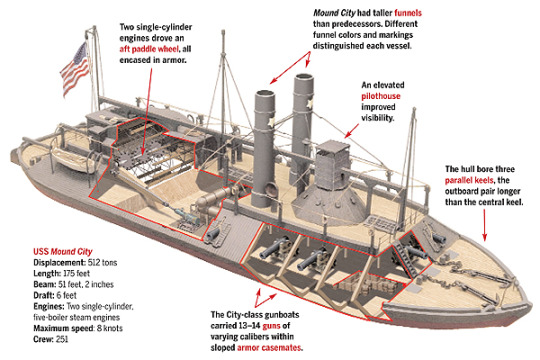
On Aug. 7, 1861, soon after the Union defeat at Manassas, Va., made it clear the Civil War would not end quickly, Union Quartermaster General Montgomery C. Meigs awarded engineer James B. Eads a contract to build seven armored gunboats for the Army’s Western Gunboat Flotilla. The City-class gunboats—designed by Eads, Commander John Rodgers and naval constructor John Lenthall and modified by Eads and naval architect Samuel M. Pook—were all commissioned by February 1862. “Pook’s Turtles,” as they were known, soon established themselves as the most powerful warships in the Western theater of operations.
The City-class gunboats differed only in detail. Mound City, whose specifications are listed in the illustration here, saw action along the Mississippi at Island No. 10, Fort Pillow/Plum Point Bend, Steeles Bayou, Grand Gulf and Vicksburg, as well as on the White and Red River campaigns. On May 10, 1862, off Fort Pillow, Confederate rams twice struck the Union gunship, which withdrew to shallow water and sank; Union shipwrights quickly returned it to service. During the bombardment of St. Charles, Ark., on June 17, 1862, a Rebel shore battery penetrated Mound City’s armor and steam drum, killing 125 of its crew and scalding another 25. Repaired once again, the gunboat served through war’s end and was decommissioned within weeks of the surrender at Appomattox.
0 notes
Text
Worthy Brief - July 4, 2023
Hold the high ground!
Philippians 4:8-9 Finally, brethren, whatsoever things are true, whatsoever things are honest, whatsoever things are just, whatsoever things are pure, whatsoever things are lovely, whatsoever things are of good report; if there be any virtue, and if there be any praise, think on these things. Those things, which ye have both learned, and received, and heard, and seen in me, do: and the God of peace shall be with you.
As the United States celebrates its birth as a nation, I thought I'd share a history lesson. In the midst of the American Civil War, President Abraham Lincoln called Vicksburg "the key to the Confederacy", and told his generals, "We do not yet have the key in our pocket!"
Taking Vicksburg was a daunting task for the Union Army because of its strategic position atop high cliffs overlooking the Mississippi River. But whoever controlled Vicksburg also controlled the shipping traffic up and down the Mississippi. Some of the bloodiest fighting took place as the Northern Army mounted bold attacks on Southern strongholds fixed atop the highest points. When the Yankees couldn't drive the Confederate army from the high ground -- they finally laid siege to Vicksburg. After a few months of being under siege, they finally surrendered on July 4, 1863. This battle, along with Gettysburg, was the turning point in the American Civil War. While the Southern army controlled the high ground, they controlled the battle and when they couldn't be driven off -- they had to be starved off the high ground, and powerfully illustrates how critical the fight for the high ground can be for determining the outcome!
Throughout history, the same principle appears over and over again – he who holds the high ground wins the battle!
This principle of warfare can also be applied to our lives. When we walk in integrity, honesty, purity, holiness, and love – we are maintaining the high ground. However tempting it may be, this is where we must not give in, compromise, or surrender! Because as soon as we begin giving up the high ground of character, losing the battle for holiness…it won't be long before the war overtakes us too.
Fight to hold your high ground -- strive to reach the top in your pursuit of God! Whatever the cost -- hold that high position, and soon… victory will be yours!
Your family in the Lord with much agape love,
George, Baht Rivka, Obadiah and Elianna (Dallas, TX)
(Mechanicsburg, PA)
Editor's Note: We are planning our Summer and Fall Tour so if you would like us to minister at your congregation, home fellowship, or Israel focused event, be sure to let us know ASAP. You can send an email to george [ @ ] worthyministries.com for more information.
0 notes
Text
Events 7.4
362 BC – Battle of Mantinea: The Thebans, led by Epaminondas, defeated the Spartans.
414 – Emperor Theodosius II, age 13, yields power to his older sister Aelia Pulcheria, who reigned as regent and proclaimed herself empress (Augusta) of the Eastern Roman Empire.
836 – Pactum Sicardi, a peace treaty between the Principality of Benevento and the Duchy of Naples, is signed.
993 – Ulrich of Augsburg is canonized as a saint.
1054 – A supernova, called SN 1054, is seen by Chinese Song dynasty, Arab, and possibly Amerindian observers near the star Zeta Tauri. For several months it remains bright enough to be seen during the day. Its remnants form the Crab Nebula.
1120 – Jordan II of Capua is anointed as prince after his infant nephew's death.
1187 – The Crusades: Battle of Hattin: Saladin defeats Guy of Lusignan, King of Jerusalem.
1253 – Battle of West-Capelle: John I of Avesnes defeats Guy of Dampierre.
1359 – Francesco II Ordelaffi of Forlì surrenders to the Papal commander Gil de Albornoz.
1456 – Ottoman–Hungarian wars: The Siege of Nándorfehérvár (Belgrade) begins.
1534 – Christian III is elected King of Denmark and Norway in the town of Rye.
1584 – Philip Amadas and Arthur Barlowe arrive at Roanoke Island
1610 – The Battle of Klushino is fought between forces of the Polish–Lithuanian Commonwealth and Russia during the Polish–Muscovite War.
1634 – The city of Trois-Rivières is founded in New France (now Quebec, Canada).
1744 – The Treaty of Lancaster, in which the Iroquois cede lands between the Allegheny Mountains and the Ohio River to the British colonies, was signed in Lancaster, Pennsylvania.
1774 – Orangetown Resolutions are adopted in the Province of New York, one of many protests against the British Parliament's Coercive Acts.
1776 – American Revolution: The United States Declaration of Independence is adopted by the Second Continental Congress.
1778 – American Revolutionary War: U.S. forces under George Clark capture Kaskaskia during the Illinois campaign.
1802 – At West Point, New York, the United States Military Academy opens.
1803 – The Louisiana Purchase is announced to the American people.
1817 – In Rome, New York, construction on the Erie Canal begins.
1818 – US Flag Act of 1818 goes into effect creating a 13 stripe flag with a star for each state. New stars would be added on 4th of July after a new state had been admitted.
1827 – Slavery is abolished in the State of New York.
1831 – Samuel Francis Smith writes "My Country, 'Tis of Thee" for the Boston, Massachusetts July 4 festivities.
1832 – John Neal delivers the first public lecture in the US to advocate the rights of women.
1832 – Durham University established by Act of Parliament; the first recognized university to be founded in England since Cambridge over 600 years earlier.
1837 – Grand Junction Railway, the world's first long-distance railway, opens between Birmingham and Liverpool.
1838 – The Iowa Territory is organized.
1845 – Henry David Thoreau moves into a small cabin on Walden Pond in Concord, Massachusetts. Thoreau's account of his two years there, Walden, will become a touchstone of the environmental movement.
1855 – The first edition of Walt Whitman's book of poems, Leaves of Grass, is published in Brooklyn.
1862 – Lewis Carroll tells Alice Liddell a story that would grow into Alice's Adventures in Wonderland and its sequels.
1863 – American Civil War: Siege of Vicksburg: Vicksburg, Mississippi surrenders to U.S. forces under Ulysses S. Grant after 47 days of siege.
1863 – American Civil War: Union forces repulse a Confederate army at the Battle of Helena in Arkansas. The Confederate loss fails to relieve pressure on the besieged city of Vicksburg, and paves the way for the Union to capture Little Rock.
1863 – American Civil War: The Army of Northern Virginia withdraws from the battlefield after losing the Battle of Gettysburg, signalling an end to the Confederate invasion of U.S. territory.
1879 – Anglo-Zulu War: The Zululand capital of Ulundi is captured by British troops and burned to the ground, ending the war and forcing King Cetshwayo to flee.
1881 – In Alabama, the Tuskegee Institute opens.
1886 – The Canadian Pacific Railway's first scheduled train from Montreal arrives in Port Moody on the Pacific coast, after six days of travel.
1887 – The founder of Pakistan, Quaid-i-Azam Muhammad Ali Jinnah, joins Sindh-Madrasa-tul-Islam, Karachi.
1892 – Western Samoa changes the International Date Line, causing Monday (July 4) to occur twice, resulting in a year with 367 days.
1894 – The short-lived Republic of Hawaii is proclaimed by Sanford B. Dole.
1898 – En route from New York to Le Havre, the SS La Bourgogne collides with another ship and sinks off the coast of Sable Island, with the loss of 549 lives.
1901 – William Howard Taft becomes American governor of the Philippines.
1903 – The Philippine–American War is officially concluded.
1910 – The Johnson–Jeffries riots occur after African-American boxer Jack Johnson knocks out white boxer Jim Jeffries in the 15th round. Between 11 and 26 people are killed and hundreds more injured.
1911 – A massive heat wave strikes the northeastern United States, killing 380 people in eleven days and breaking temperature records in several cities.
1913 – President Woodrow Wilson addresses American Civil War veterans at the Great Reunion of 1913.
1914 – The funeral of Archduke Franz Ferdinand and his wife Sophie takes place in Vienna, six days after their assassinations in Sarajevo.
1918 – Mehmed V died at the age of 73 and Ottoman sultan Mehmed VI ascends to the throne.
1918 – World War I: The Battle of Hamel, a successful attack by the Australian Corps against German positions near the town of Le Hamel on the Western Front.
1927 – First flight of the Lockheed Vega.
1939 – Lou Gehrig, recently diagnosed with Amyotrophic lateral sclerosis, informs a crowd at Yankee Stadium that he considers himself "The luckiest man on the face of the earth", then announces his retirement from major league baseball.
1941 – Nazi crimes against the Polish nation: Nazi troops massacre Polish scientists and writers in the captured Ukrainian city of Lviv.
1941 – World War II: The Burning of the Riga synagogues: The Great Choral Synagogue in German-occupied Riga is burnt with 300 Jews locked in the basement.
1942 – World War II: The 250-day Siege of Sevastopol in the Crimea ends when the city falls to Axis forces.
1943 – World War II: The Battle of Kursk, the largest full-scale battle in history and the world's largest tank battle, begins in the village of Prokhorovka.
1943 – World War II: In Gibraltar, a Royal Air Force B-24 Liberator bomber crashes into the sea in an apparent accident moments after takeoff, killing sixteen passengers on board, including general Władysław Sikorski, the commander-in-chief of the Polish Army and the Prime Minister of the Polish government-in-exile; only the pilot survives.
1946 – The Kielce pogrom against Jewish Holocaust survivors in Poland.
1946 – After 381 years of near-continuous colonial rule by various powers, the Philippines attains full independence from the United States.
1947 – The "Indian Independence Bill" is presented before the British House of Commons, proposing the independence of the Provinces of British India into two sovereign countries: India and Pakistan.
1950 – Cold War: Radio Free Europe first broadcasts.
1951 – Cold War: A court in Czechoslovakia sentences American journalist William N. Oatis to ten years in prison on charges of espionage.
1951 – William Shockley announces the invention of the junction transistor.
1954 – Rationing ends in the United Kingdom.
1960 – Due to the post-Independence Day admission of Hawaii as the 50th U.S. state on August 21, 1959, the 50-star flag of the United States debuts in Philadelphia, almost ten and a half months later (see Flag Acts (United States)).
1961 – On its maiden voyage, the Soviet nuclear-powered submarine K-19 suffers a complete loss of coolant to its reactor. The crew are able to effect repairs, but 22 of them die of radiation poisoning over the following two years.
1966 – U.S. President Lyndon B. Johnson signs the Freedom of Information Act into United States law. The act went into effect the next year.
1976 – Israeli commandos raid Entebbe airport in Uganda, rescuing all but four of the passengers and crew of an Air France jetliner seized by Palestinian terrorists.
1976 – The U.S. celebrates its Bicentennial.
1977 – The George Jackson Brigade plants a bomb at the main power substation for the Washington state capitol in Olympia, in solidarity with a prison strike at the Walla Walla State Penitentiary Intensive Security Unit.
1982 – Three Iranian diplomats and a journalist are kidnapped in Lebanon by Phalange forces, and their fate remains unknown.
1987 – In France, former Gestapo chief Klaus Barbie (a.k.a. the "Butcher of Lyon") is convicted of crimes against humanity and sentenced to life imprisonment.
1994 – Rwandan genocide: Kigali, the Rwandan capital, is captured by the Rwandan Patriotic Front, ending the genocide in the city.
1997 – NASA's Pathfinder space probe lands on the surface of Mars.
1998 – Japan launches the Nozomi probe to Mars, joining the United States and Russia as a space exploring nation.
2001 – Vladivostock Air Flight 352 crashes on approach to Irkutsk Airport killing all 145 people on board.[4]
2002 – A Boeing 707 crashes near Bangui M'Poko International Airport in Bangui, Central African Republic, killing 28.
2004 – The cornerstone of the Freedom Tower is laid on the World Trade Center site in New York City.
2004 – Greece beats Portugal in the UEFA Euro 2004 Final and becomes European Champion for first time in its history.
2005 – The Deep Impact collider hits the comet Tempel 1.
2006 – Space Shuttle program: Discovery launches STS-121 to the International Space Station. The event gained wide media attention as it was the only shuttle launch in the program's history to occur on the United States' Independence Day.
2009 – The Statue of Liberty's crown reopens to the public after eight years of closure due to security concerns following the September 11 attacks.
2009 – The first of four days of bombings begins on the southern Philippine island group of Mindanao.
2012 – The discovery of particles consistent with the Higgs boson at the Large Hadron Collider is announced at CERN.
2015 – Chile claims its first title in international football by defeating Argentina in the 2015 Copa América Final.
0 notes
Text
it’s almost vicksburg surrender time and my favorite tradition of finding funny depictions of the surrender is back!
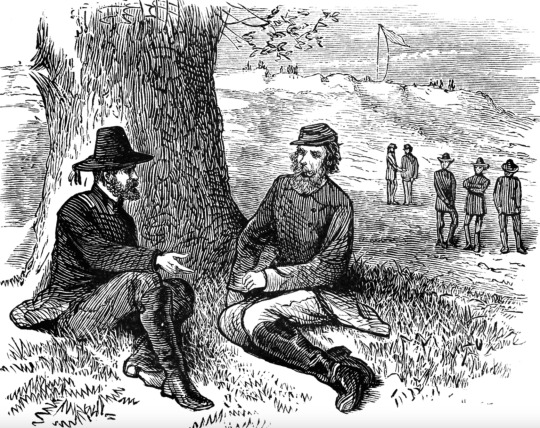
i hope pemberton sat JUST like that
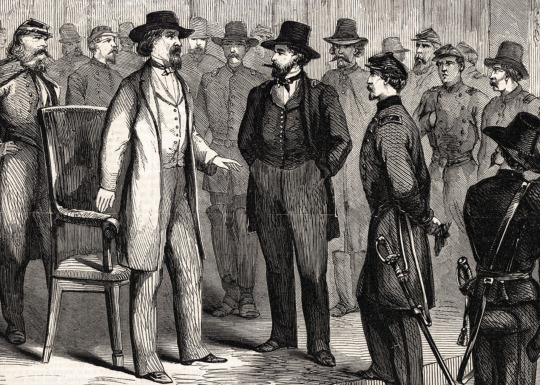
grant has never looked so unbothered by something
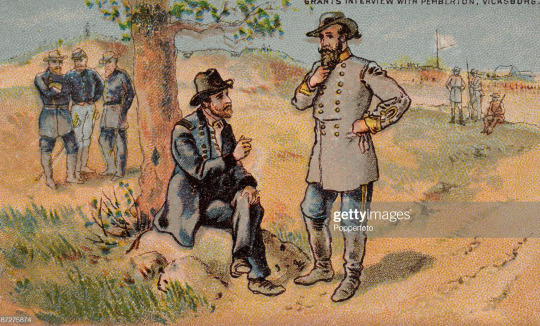
the three in the back look like their whispering gossip or something
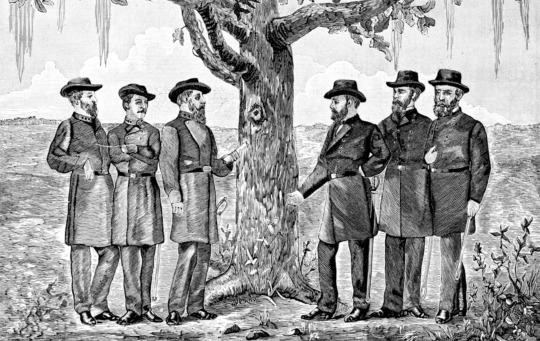
and this is the best because....
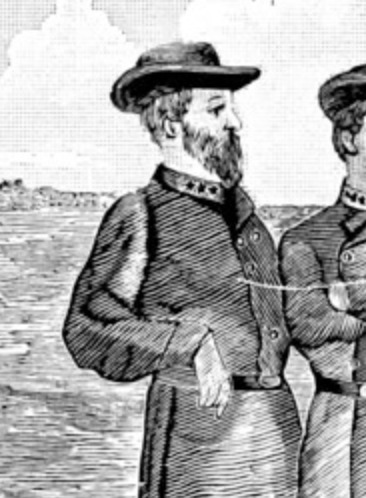
what we doing here
#my ramblings#i may make one for gettysburg cause i am SURE i can find some silly stuff#did i already post the one with meade's eyes almost POPPING out of his head?#that one cracks me up#but really what we doing with bowen's hand there#fun fact about bowen! he and grant actually knew each other from the time that grant lived in MO#anddd he also died a few days after the surrender from *spins the 19th century sickness wheel*#dysentery! the usual suspect
5 notes
·
View notes
Text
History
July 4, 1776 - The Declaration of Independence was approved by the Continental Congress.
July 4, 1863- Vicksburg, the last Confederate stronghold on the Mississippi River, surrendered to General Grant and the Army of the West after a six week siege. With the Union in control of the Mississippi, the Confederacy was effectively split in two, cut off from its western allies.
July 4, 1882 - The "Last Great Buffalo Hunt" began on Indian reservation lands near Hettinger, North Dakota as 2,000 Teton Sioux Indians in full hunting regalia killed about 5,000 buffalo. By this time, most of the estimated 60-75 million buffalo in America had been killed by white hunters who usually took the hides and left the meat to rot. By 1883, the last of the free-ranging buffalo were gone.
Birthday - Novelist and short-story writer Nathaniel Hawthorne (1804-1864) was born in Salem, Massachusetts. His works included; The Scarlet Letter, The House of the Seven Gables and The Blithedale Romance.
Birthday - Song writer Stephen Foster (1826-1864) was born in Lawrenceville, Pennsylvania. Among his nearly 200 songs were; Oh! Susanna, Camptown Races, Swanee River, Jeanie with the Light Brown Hair, and Beautiful Dreamer. He died in poverty at Bellevue Hospital in New York.
Birthday - Calvin Coolidge (1872-1933) the 30th U.S. President was born in Plymouth, Vermont. He became President on August 3, 1923, after the death of Warren G. Harding. In 1924, Coolidge was elected President but did not run for re-election in 1928.
0 notes